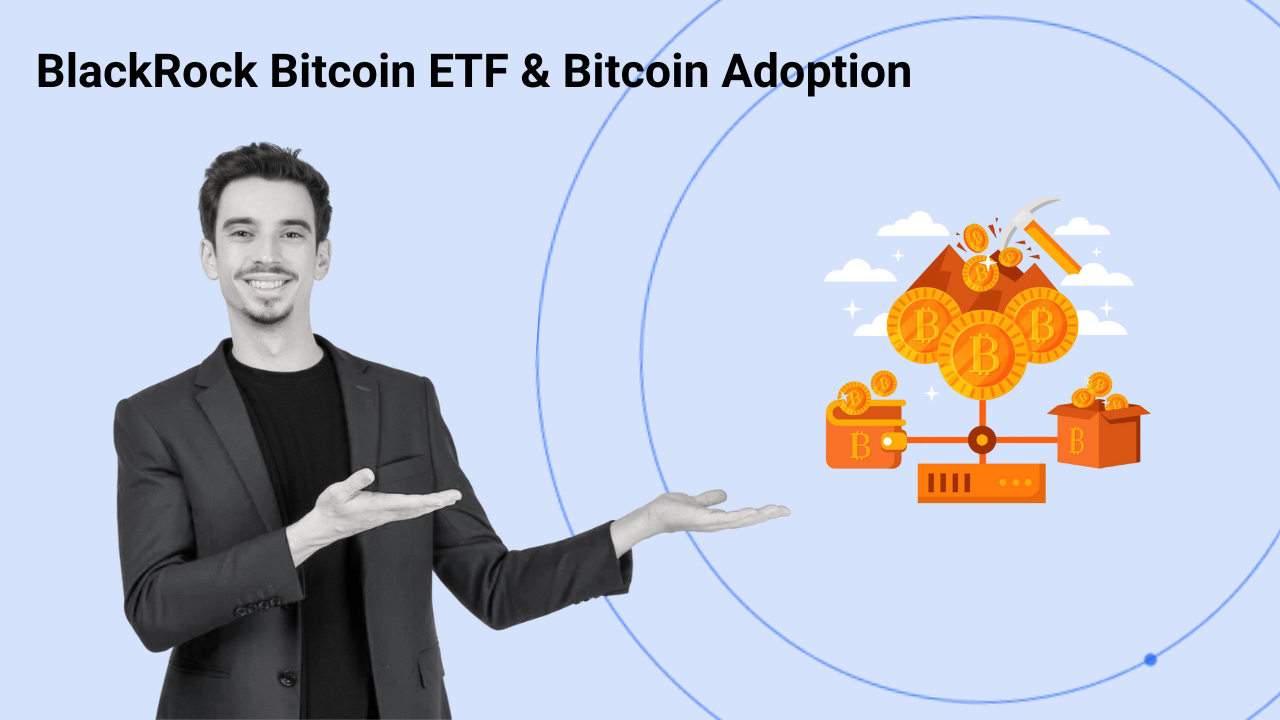BlackRock’s Bitcoin ETF marks a significant milestone in the institutional adoption of Bitcoin. As the world’s largest asset manager, BlackRock’s entry into the crypto space signals growing confidence in Bitcoin as a legitimate investment asset. This move is expected to influence market perception, attract institutional investors, and potentially drive regulatory shifts.
With increasing demand for regulated Bitcoin investment products, BlackRock’s Bitcoin ETF could pave the way for mainstream acceptance. This blog explores its impact on Bitcoin adoption, institutional trust, price stability, and the potential future of Bitcoin ETFs in India.
What is a Bitcoin ETF?
A Bitcoin exchange-traded fund (ETF) is a financial product that allows investors to gain exposure to Bitcoin without directly owning or managing the cryptocurrency. It operates like a traditional ETF, tracking Bitcoin’s price and enabling investors to trade shares on regulated stock exchanges.
Types of Bitcoin ETFs
- Spot Bitcoin ETFs – These ETFs directly hold Bitcoin, reflecting real-time price movements.
- Futures Bitcoin ETFs – These ETFs invest in Bitcoin futures contracts rather than holding the actual asset, leading to price differences due to market speculation.
Why Investors Prefer Bitcoin ETFs
- Regulated and secure – Provides access to Bitcoin through traditional financial markets, reducing risks associated with unregulated crypto exchanges.
- Easier access – No need for a crypto wallet or private keys.
- Tax efficiency – May offer better tax treatment than direct Bitcoin ownership in some jurisdictions.
Bitcoin ETFs bridge the gap between traditional finance and digital assets, making Bitcoin more accessible to a broader range of investors.
BlackRock’s Bitcoin ETF: A Game Changer?
BlackRock’s decision to launch a Bitcoin ETF marks a significant shift in institutional engagement with cryptocurrency. As the world’s largest asset manager, BlackRock’s entry into the Bitcoin ETF market adds credibility to Bitcoin as an investment asset and could accelerate mainstream adoption.
Why is BlackRock’s Bitcoin ETF Significant?
- Institutional validation – BlackRock’s involvement signals growing trust in Bitcoin as a legitimate financial asset.
- Increased accessibility – A regulated Bitcoin ETF provides a secure and convenient way for investors to gain exposure to Bitcoin.
- Potential market impact – Higher institutional demand could lead to increased liquidity and price stability.
How BlackRock’s ETF Differs from Previous Attempts
- Unlike past Bitcoin ETF proposals that faced regulatory hurdles, BlackRock’s strong track record and influence in financial markets may improve approval chances.
- The firm’s reputation could encourage other major institutions to consider Bitcoin-related investment products.
BlackRock’s move may set a precedent for more institutional-grade Bitcoin products, potentially transforming how Bitcoin is perceived in global financial markets.
Institutional Trust and Bitcoin’s Legitimacy
BlackRock’s entry into the Bitcoin ETF market could redefine how institutional investors perceive Bitcoin. Historically seen as a speculative asset, Bitcoin is gradually gaining recognition as a legitimate investment vehicle, and BlackRock’s involvement may accelerate this shift.
How BlackRock’s Move Impacts Institutional Perception
- Increased credibility – A Bitcoin ETF from a well-established firm like BlackRock enhances trust in Bitcoin as an investable asset.
- Regulatory confidence – Institutional backing may push regulators to create clearer guidelines for Bitcoin and other cryptocurrencies.
- Potential influence on other asset managers – Firms like Fidelity and Vanguard may follow BlackRock’s lead in launching Bitcoin-related products.
With a major player like BlackRock legitimising Bitcoin through an ETF, institutional participation could rise significantly, leading to broader adoption and a more stable market.
How BlackRock’s Bitcoin ETF Could Influence Bitcoin Prices
The launch of BlackRock’s Bitcoin ETF is expected to have a significant impact on Bitcoin’s price dynamics. Increased institutional participation could drive higher demand, affecting liquidity and volatility.
Could Institutional Demand Push Bitcoin Prices Higher?
- A regulated ETF allows large-scale investors, including pension funds and hedge funds, to gain exposure to Bitcoin, potentially increasing buying pressure.
- If demand surpasses supply, Bitcoin’s price could experience sustained upward momentum.
Will Bitcoin Become Less Volatile?
- Greater institutional ownership may reduce speculative trading, leading to more stability.
- However, large market movements driven by institutional inflows or outflows could still cause price swings.
Could an ETF Reduce Market Manipulation?
- A regulated ETF offers transparency, reducing the risk of price manipulation often seen in unregulated crypto exchanges.
- BlackRock’s involvement could lead to improved market structure, making Bitcoin a more reliable investment.
While Bitcoin remains a volatile asset, BlackRock’s ETF could introduce more stability and long-term price appreciation due to increased institutional interest.
Bitcoin ETF in India: What Could Change?
The approval of BlackRock’s Bitcoin ETF in global markets raises questions about the future of Bitcoin ETFs in India. While cryptocurrency regulations remain uncertain, BlackRock’s move could influence how Indian regulators and investors perceive Bitcoin-based financial products.
Current Status of Bitcoin ETFs in India
- The Securities and Exchange Board of India (SEBI) has not approved any Bitcoin ETFs due to regulatory concerns.
- The Reserve Bank of India (RBI) remains cautious about cryptocurrencies, citing risks related to financial stability.
- Indian investors currently access Bitcoin through global exchanges or indirect investments.
Could BlackRock’s ETF Influence Indian Regulations?
- If global Bitcoin ETFs gain traction, Indian regulators may explore a framework for similar products.
- Increased institutional participation worldwide may encourage Indian financial institutions to push for Bitcoin investment options.
- A well-regulated ETF could provide an alternative to direct crypto investments, aligning with investor protection measures.
While India’s stance on cryptocurrency remains restrictive, global acceptance of Bitcoin ETFs may gradually pave the way for future regulatory discussions in the country.
Bitcoin’s Future: Store of Value or Speculative Asset?
BlackRock’s Bitcoin ETF could shift Bitcoin’s perception from a speculative asset to a more established store of value, similar to gold. As institutional participation increases, Bitcoin’s long-term role in financial markets may evolve.
Will Bitcoin Be Viewed More Like Digital Gold?
- Institutional investments often seek stability, which could reinforce Bitcoin’s position as a hedge against inflation and economic uncertainty.
- If major asset managers continue to adopt Bitcoin, it may gain further acceptance as a long-term store of value.
What Challenges Remain for Bitcoin’s Mainstream Adoption?
- Regulatory uncertainty – Governments worldwide are still formulating policies around Bitcoin and digital assets.
- Volatility concerns – While institutional demand may reduce extreme price swings, Bitcoin still experiences significant fluctuations.
- Competing narratives – Some investors see Bitcoin as a speculative asset, while others believe in its potential as a decentralised financial system.
BlackRock’s move signals a step toward Bitcoin’s mainstream acceptance, but its long-term role will depend on regulatory developments and continued institutional interest.
Final Thoughts on BlackRock’s Bitcoin ETF
BlackRock’s Bitcoin ETF represents a major step toward institutionalising Bitcoin, bringing greater legitimacy and accessibility to the cryptocurrency market. With a trusted financial giant backing Bitcoin, adoption among institutional and retail investors could accelerate, potentially stabilising prices and improving market transparency.
While regulatory challenges remain, BlackRock’s move could encourage other asset managers to explore Bitcoin ETFs, shaping the future of cryptocurrency investments. As Bitcoin transitions from a speculative asset to a recognised store of value, investors must stay informed about market trends and regulatory shifts.
Research-driven insights, such as those from Streetgains, can help investors navigate the evolving landscape of Bitcoin and cryptocurrency investments.
Disclaimer:
The content in this blog is intended for informational purposes only and does not constitute investment advice, stock recommendations, or trade calls by Streetgains. The securities and examples mentioned are purely for illustration and are not recommendatory.
Investments in the securities market are subject to market risks. Please read all related documents carefully before investing.
BlackRock’s Bitcoin ETF and Bitcoin Adoption FAQs:
BlackRock’s involvement adds credibility to Bitcoin, making it more attractive to institutional investors who previously viewed it as a speculative asset. A regulated ETF provides a safer and more accessible way for large firms to invest in Bitcoin.
Yes, firms like Fidelity and Vanguard are already exploring Bitcoin ETFs. BlackRock’s entry into the market could encourage more traditional financial institutions to introduce similar investment products.
While Fidelity has been active in Bitcoin-related offerings, BlackRock’s reputation and influence in traditional finance may accelerate Bitcoin’s adoption at a larger scale. Vanguard has been more cautious but may reconsider its stance if institutional demand increases.
Yes, an influx of institutional capital through an ETF could increase demand for Bitcoin, potentially driving prices higher. However, long-term price movements will depend on overall market conditions and adoption rates.
BlackRock’s involvement strengthens Bitcoin’s reputation as a long-term investment, similar to gold. However, its volatility and evolving regulatory landscape mean some investors may still see it as speculative.
India has not approved any Bitcoin ETFs due to regulatory concerns. However, BlackRock’s success in global markets may influence Indian regulators to reconsider their stance in the future.
Increased institutional participation could reduce extreme price swings by improving liquidity. However, large trades from institutions could still cause short-term fluctuations.
A regulated ETF brings more transparency and oversight, potentially reducing price manipulation seen on unregulated crypto exchanges.
Streetgains provides research-driven insights on market movements, helping investors stay informed about Bitcoin’s evolving role in institutional finance and broader financial markets.
FAQs:
-
1. How to earn money daily from trading?
Earning money daily from trading involves strategies like day trading, where traders capitalise on small price movements within the same day. Success requires real-time market analysis, quick decision-making, and risk management.
-
2. How to earn money from equity trading?
To earn money from equity trading, you need to buy stocks at a lower price and sell them at a higher price. Success depends on researching companies, analysing stock trends, and using technical or fundamental analysis.
-
3. How to earn money from share trading in India?
In India, share trading offers profit potential through buying and selling stocks on exchanges like the NSE and BSE. To maximise returns, traders should use market research, tools like technical analysis, and risk management strategies.
-
4. How to make money from share trading in India?
Making money from share trading involves selecting the right stocks, timing the market, and implementing trading strategies like swing trading or day trading while staying informed about market trends.
-
5. How to transfer money from a trading account to a bank account?
To transfer money from your trading account to your bank, log into your trading platform, navigate to the funds section, and initiate a withdrawal request. The money will typically be credited to your linked bank account in 1 to 3 days.
-
6. How to withdraw money from a trading account?
You can withdraw funds by logging into your trading account, selecting the withdrawal option, and selecting the amount to transfer to your bank account. Ensure your bank account is linked and follow any steps your broker requires.
Subscribe to our Credits-Based Research System:
Pay only for successful research calls!












